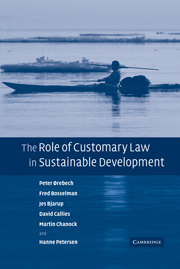Book contents
- Frontmatter
- Contents
- Preface
- Acknowledgements
- Table of cases
- List of international conventions
- Introduction
- 1 The linkage between sustainable development and customary law
- 2 Three case studies from Hawaii, Norway and Greenland
- 3 Social interaction: the foundation of customary law
- 4 How custom becomes law in England
- 5 How custom becomes law in Norway
- 6 Adaptive resource management through customary law
- 7 The place of customary law in democratic societies
- 8 Customary law, sustainable development and the failing state
- 9 Towards sustainability: the basis in international law
- 10 The case studies revisited
- 11 The choice of customary law
- 12 Conclusion: customary law in a globalizing culture
- References
- Index
- Authors index
6 - Adaptive resource management through customary law
Published online by Cambridge University Press: 18 December 2009
- Frontmatter
- Contents
- Preface
- Acknowledgements
- Table of cases
- List of international conventions
- Introduction
- 1 The linkage between sustainable development and customary law
- 2 Three case studies from Hawaii, Norway and Greenland
- 3 Social interaction: the foundation of customary law
- 4 How custom becomes law in England
- 5 How custom becomes law in Norway
- 6 Adaptive resource management through customary law
- 7 The place of customary law in democratic societies
- 8 Customary law, sustainable development and the failing state
- 9 Towards sustainability: the basis in international law
- 10 The case studies revisited
- 11 The choice of customary law
- 12 Conclusion: customary law in a globalizing culture
- References
- Index
- Authors index
Summary
Some customary law systems work better than others. This chapter suggests that there are particular characteristics of certain customary law systems that indicate whether these systems are more likely to accomplish sustainable development objectives than other systems. The chapter focuses on a characteristic of complex systems that has received increasing attention in the literature of management, law, ecology and economics – resilience, defined as the system's ability to adapt to changing conditions.
Sustainable development requires management of resources in order to ensure that they can be adequately utilized both now and in the future. The customary law systems that are most relevant to that objective are those that deal with resource management. This chapter will evaluate systems of customary law for resource management from an instrumental perspective. How can we tell whether a particular system of customary law will succeed in managing resources in a way that produces sustainable development? In other words, will a given body of customary law work in a way that meets long-range objectives?
The first part of this chapter reviews the reasons why resource management systems need to be resilient. As we recognize the increased speed with which the earth's ecology, technology and social structure is changing, we recognize that any resource management system, whether or not customary in origin, needs to be capable of adaptation to a wide range of future changes in the surrounding environment if it is to operate in a sustainable manner.
- Type
- Chapter
- Information
- The Role of Customary Law in Sustainable Development , pp. 245 - 281Publisher: Cambridge University PressPrint publication year: 2006

